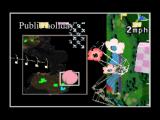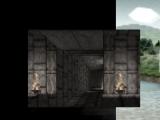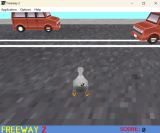
Neut Tower finds a software developer named Jaye trapped in her office after an earthquake. Working together with NEUT, a program she's written to traverse the inner machinery of the tower, she must repair the damage and hack her way to freedom.
EDIT! I've been continuing to work on this and have put out a more fleshed-out "shareware" release! Now featuring more levels, sound effects, savegame support, a boss key, title screen menu, and ANSI shareware catalog. I'm really happy with how it has come together and think it's some of my best work!
ORIGINAL POST FOLLOWS:
What's up Glorious Trainwrecks! It's been a looong time since I released a game!
It so happened that this year, Global Game Jam coincided with a weekend during which the rest of my family would not be around, my house would be totally empty, and I would be highly susceptible to cabin fever if I didn't get out and do SOMETHING. So I figured, what the hell, let's make a game.
I knew going in that I kind of wanted to make a game where you controlled multiple characters that had to cooperate with each other to progress, and where the whole puzzle was laid out on a single screen. I have a special fondness for games like this; for whatever reason I keep coming back to Gobliiins & DataSoft Goonies. I didn't find out the theme ("repair") until Saturday morning, but in the shower I came up with a central conceit that I liked, and a bunch of mechanics that could fit.
I decided to write the game on a 286 MS-DOS PC. No emulators, real hardware. I did this because for about the past year I have been noodling around on a game, and had ended up with a reasonably capable engine (devlog) that I knew inside and out, having written every line of it. It has integrated sprite, tile & map editors and an interactive debugging console that runs over a serial port, and is fully scriptable with a Forth-based programming language interpreter (devlog). So I knew it was capable of being a solid basis for my game idea, and I knew I wouldn't have to spend any time reading bad documentation and learning how to do things, like I would have with Unity or Godot or a Javascript framework.
Anyway! Two days later and I'm really happy with how it turned out! I hope you all like it! I will probably keep working on it!







Comments
How would I get this to run
How would I get this to run on Windows 10?
It should run fine inside
It should run fine inside DOSBox, or else just click the archive.org link to play in your browser. It takes a little while to start up the first time.
I enjoyed this. I could
I enjoyed this. I could imagine this as a full game with some variety in how the mechanic is used. I wonder what the attraction is in using such technology? Genuine question, I'm always interested in what motivates people to embrace obscure interests. Was there supposed to be sound btw? I played the web version in Firefox and there was no sound.
Did not have time to
Did not have time to implement any sound, sadly. I do have some code in my engine to drive Adlib sound / music but my tools for _creating_ such sounds are still very limited. Might be a fun exercise to try to generate some simple sound effects though.
So, there are a couple of driving forces that make me consider the MS-DOS PC as an interesting platform. The DOS shareware aesthetic has always been a huge influence on me, because it was so obvious that shareware games were made by individual people, working within the limits of their tools and knowledge. As a kid, I didn't have those tools and knowledge, but I had a very strong belief that they were attainable, that if I just learned enough, and kept making things, eventually I too could make a janky shareware game.
In a lot of ways, the engine that I've built for myself over the past year, and the game that I just made, is proving to myself that this belief was actually true. Because at the time, I failed. Over and over again. Computers got more and more complex, and the knowledge I needed kept changing. I spent a lot of time playing catch-up, trying to learn things and not quite getting there before those things became irrelevant. To be able to attain the skills I spent my childhood struggling and yearning to attain, to master these problems that once stymied me, to show myself that I wasn't as lost as I'd thought, the challenges weren't as insurmountable as I'd feared - it's strong stuff! It feels really, really good!
It also connects me very directly to a tradition of personal computing that I feel is in some danger of disappearing entirely. Using an MS-DOS 286 is is taking direct control of what my computer does. It is ownership of everything that is on it. Software that was released for it is empowering in a qualitatively different way than today's software; there are unspoken assumptions of user autonomy baked into the tools that I've watched be eroded to nothing over the past twenty years. In the past, the antisocial software that violated those assumptions were viruses, and spyware, and they were to be avoided and eradicated when found. In 2020, all software is spyware; all software is trying to be viral.
I wonder: can I take this slow, simple machine, build things for it, and learn something from that act that I can bring back to computing today? And I think I can. Articulating exactly what isn't easy, but, I'm working on it.